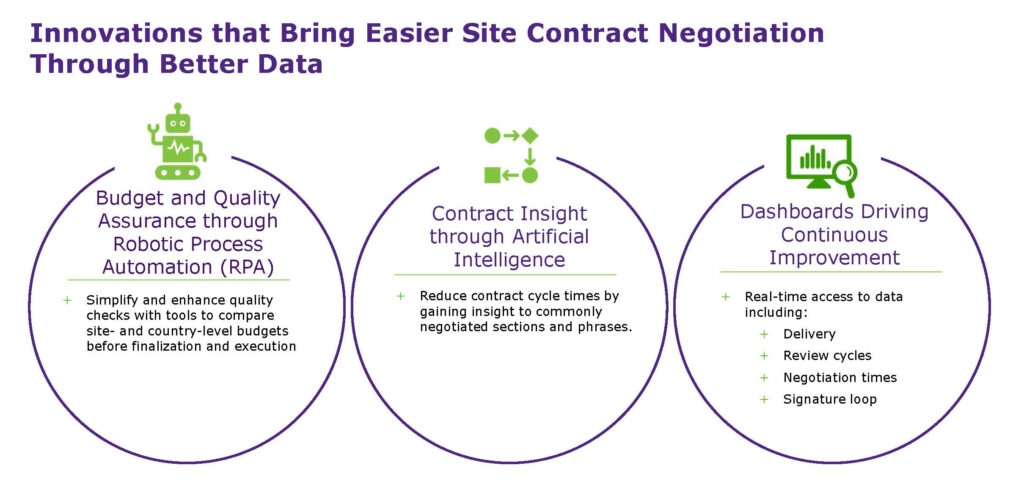
Technology and Innovations to Refine Site Contracting Processes

Jeffrey Zimmerman, director of Technology Innovation at PPD; Scott Lundy, senior director of Site Contracting at PPD; and John Van Hoy, executive director of Data Science at PPD explain how technology is aiding in the reduction of contract inefficiencies.
Technology and Innovations to Refine Site Contracting Processes
Site contracting is often viewed as rate-limiting to site activation and patient enrollment. This is due to the difficulty of bringing together disparate parties in negotiations and the frequency that site contracts are the last deliverable needed before activation.
But, over the last two years, Global Site Contracts (GSC), in collaboration with PPD Technology Innovation, PPD Data Science and PPD® Digital, has made significant investments in innovative technologies and developed in-house tools, including robotic process automation (RPA) and machine learning to change the way we contract with sites. These modernizations are driving efficiency, eliminating administrative activities, improving quality and reducing the time required for contract negotiations.
These tools and technologies include:
- Targeted Institution Metric Tool: A PPD developed dashboard that provides insight into prior site/client contracting cycle times, allowing for better and more informed site selection and more transparent activation planning.
- Global Site Contracts Digital Assistant: A PPD developed RPA tool used to create client-specific template documents, including power of attorney, clinical trial agreements (CTAs) and ancillary contracts, that allows contract managers to enter study specific information, then creates template documents for all countries within the study and emails them to the contract manager within minutes.
- Budget Quality Assurance Tool: A PPD developed RPA tool that compares country- and site-level budgets before finalization and execution, simplifying and enhancing quality checks. The GSC team is quickly alerted to any potential discrepancies for targeted review, correction, or confirmation.
- MADdash: An RPA solution that extracts initial template documents, negotiation version and final executed CTAs from Oracle Activate and automatically files within the appropriate folders in PPD’s SharePoint site contracts repository. This tool drives efficiency by reducing administrative tasks and improves quality by ensuring a complete record of contract negotiations.
Chief among the technologies driving forward site contracting at PPD is the Site Contracts Analytics and Negotiation (SCAN) engine.
A proven strategy to expedite site contracting is to use prior negotiated agreements with sites to anticipate challenges and avoid renegotiating key clauses. But, CROs and sponsors face major challenges enacting this strategy because of large repositories of prior agreements and differences between templates across sponsors and countries.
The SCAN Engine overcomes many of these challenges through the application of machine learning (ML) and natural language processing (NLP). This tool improves efficiency and speed by quickly mining our repository of historical contract negotiations, extracting insight from those agreements and providing precedent that can shorten contract negotiations.
The SCAN Engine presents an easy-to-use dashboard from which contract managers can use to:
- View historical negotiation cycle times associated with the sites on their study;
- Review data analytics that anticipate what sections of a contract a site is likely to negotiate and how difficult their requested changes to each section may be;
- Access prior negotiated agreements at the click of a button, without combing through contract repositories;
- And, see what language sites have accepted across multiple sponsors to provide context and anticipate future challenges.
A key goal of the SCAN Engine is to reduce the number of site touchpoints. Our analysis of performance data indicates that the majority of the overall site contracting cycle time is spent with the documents at sites, and much of that time comes before the site provides their first revisions. To influence this, better templates are needed from the outset that anticipate the site needs. Using the SCAN Engine, we can develop templates that take into account precedent and understanding of site-specific positions prior to commencement of negotiations. And, during negotiations, we can address requests with fallback language available in our previously negotiated agreements to avoid repetitive and unnecessary negotiations.
The SCAN Engine also enables PPD to partner with sponsors by presenting actionable intelligence on what areas of sponsor templates are most negotiated and how this compares to other sponsors. We use that to drive improvements to templates and negotiation parameters, which accelerates cycle times and improves site relationships.
Technology is bringing standardized data reporting, enabling efficiencies and providing holistic management of site contract activities. Our recent innovations are making things better by not only improving consistency and quality of the site contract work but increasing the intelligence we bring to our client relationships.
